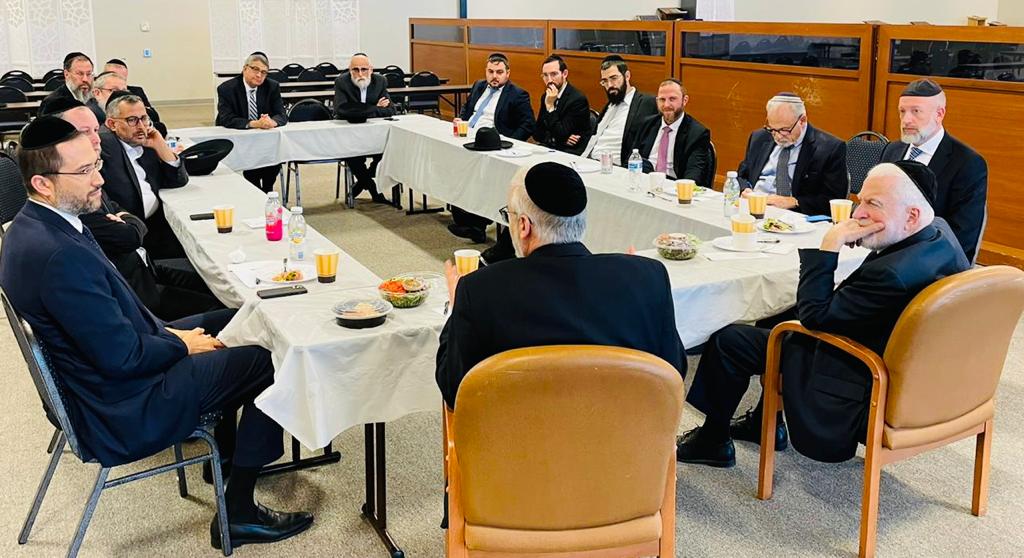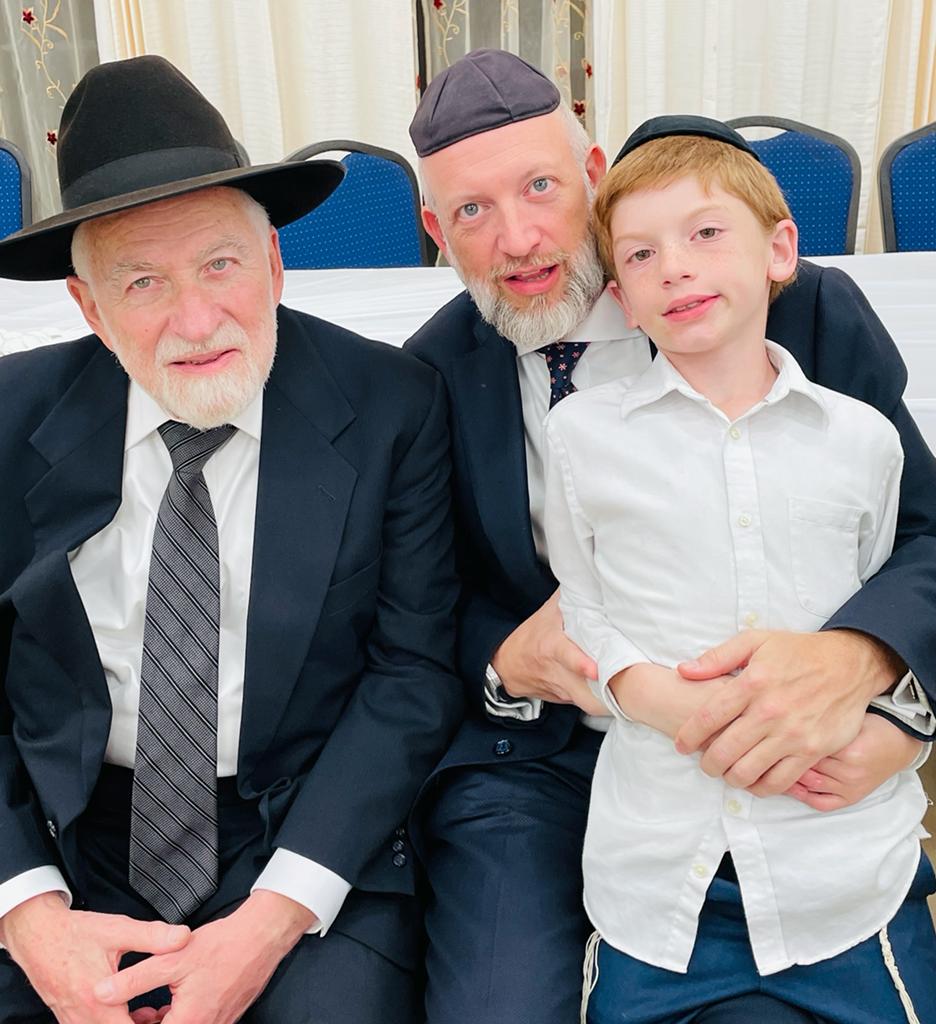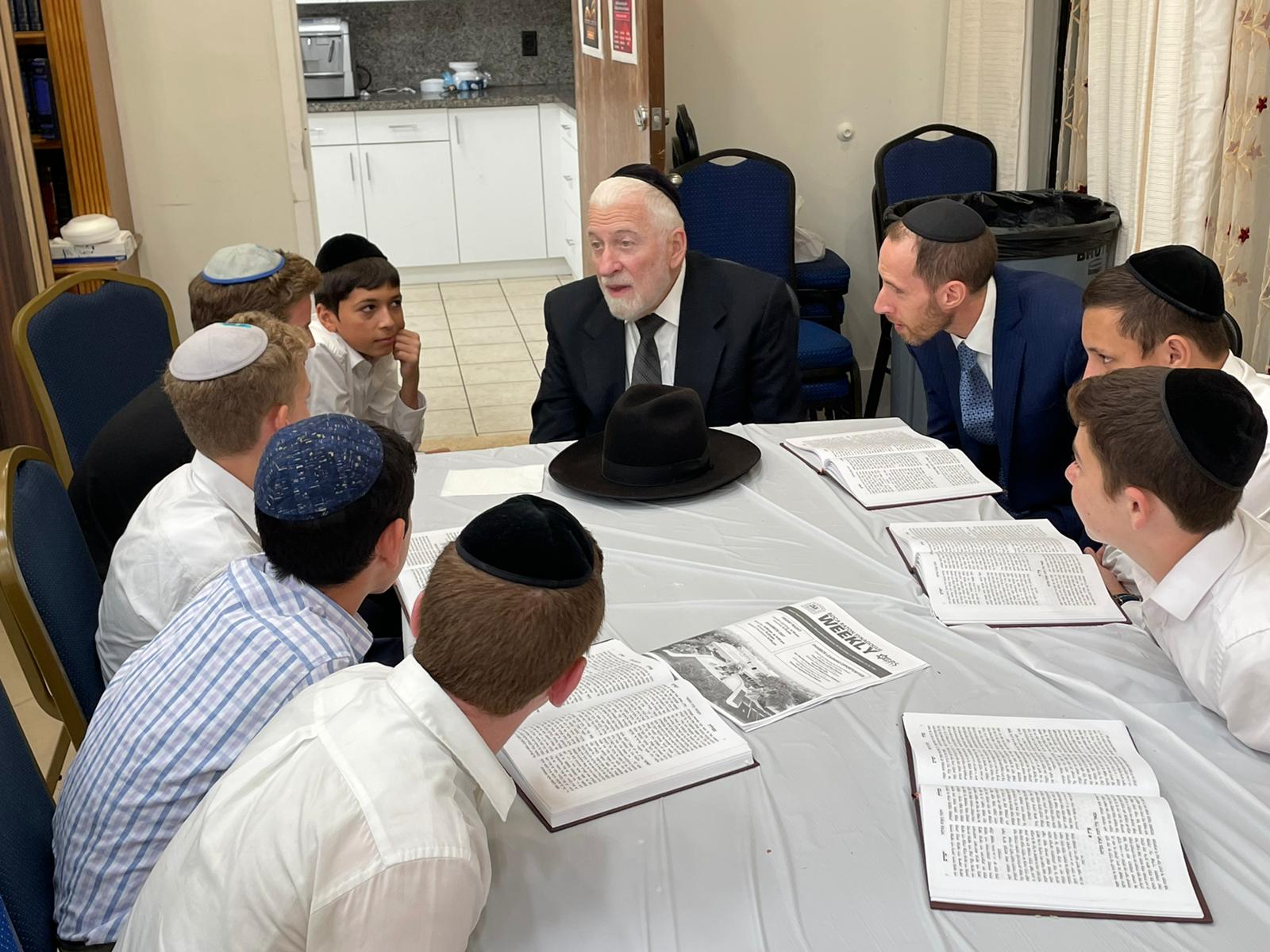December 1, 2021|כ"ז כסלו ה' אלפים תשפ"ב Still Giving Me Goosebumps: Our Shabbos With Rav Hershel Schachter
Print Article
Non-human mammals get what we call goosebumps, the constriction of skin surrounding hair follicles, when they feel threatened or attacked. Only human beings get goosebumps for a different feeling: awe. Awe is the feeling of being in the presence of greatness, of being exposed to that which is transcendent or extraordinary.
I will never forget the goosebumps and feeling of awe I felt when I first heard shiur from Mori V’Rabi, Rav Schachter, at YU twenty-seven years ago. His encyclopedic knowledge, capacity to weave together sources from the width and breadth of Torah, his stamina to give shiur daily for two hours straight without so much as a pause, a hesitation or a need to think, simply blew me away. Without exaggeration, I vividly remember often getting goosebumps in shiur, the result of feeling I was in the presence of someone extraordinary.
Being in Rav Schachter’s shiur then, and continuing to listen and learn from him ever since, has not only giving me access to an enormous wellspring of Torah, it provides something else that is special and critically important: contact with, and access to, greatness.

The Navi (Yeshayahu 30:20) teaches, "V’hayu einecha ro’os es morecha, Your eyes shall see your teachers." Though the pasuk is talking about God, our rabbis have interpreted it as an encouragement to look at and see the face of our great Torah teachers. Watching a righteous and great person can be life-changing. This was the case for Elisha after he came in contact with Eliyahu. Reish Lakish was changed forever after meeting Rav Yochanan (See Bava Metzia 84a). The Talmud (Eruvin 13b) quotes Rebbe Yehudah HaNasi who said, “I was sharper in Torah study than my friends because I saw Rabbi Meir from behind, and had I seen him from the front I would have been even sharper.”
Boca Raton Synagogue has been hosting Rav and Rebbetzin Schachter for many years, enabling and inviting our community to be exposed to greatness and the opportunity to get goosebumps. As the years have passed, our awe has not dulled, it has only grown. We were privileged to host Rav Schachter last Shabbos and it was our best one yet.

I recorded some highlights to serve as personal inspiration for me, and I’m sharing them here so you can get goosebumps too:
· Stamina: Rav Schachter celebrated his 80th birthday this year, bli ayin harah. When others are slowing down, or retiring altogether, he seems to only be picking up. Traveling, being hosted by others, and being “on” for days at a time can be exhausting, leaving many scholars in residence only willing to speak a few times on their visit. By contrast, Rav Schachter asks us to line up as many opportunities as possible, from the moment he lands until he leaves, to maximize his Torah teaching and justify his leaving Yeshiva. On this trip, aside from his shiur on Thursday night delivered soon after he arrived, he spoke seven times on Friday and six times over Shabbos and Motzei Shabbos. His energy, clarity, and comprehensiveness were as strong in the last slot of the day as the first. His strength and stamina that come from his love for and commitment to teaching Torah are simply mindboggling.
· Mindfulness: The Zohar (3:29a) says that Talmidei Chachamim, Torah scholars, are called “Shabbos.” In his Menuchas Ha’Nefesh, Rav Chaim Friedlander explains that our righteous scholars are able to experience Shabbos all week long because they are in a perpetual state of focus, of not being connected to that which distracts or diverts attention and mindfulness. One of the most impressive things about Rav Schachter is his capacity to be fully immersed and engrossed in whatever he is doing at that moment. There were countless people lined up to speak to him after each presentation and he gave each of them, including many young children, his full attention, making them each feel like the most important person in the world at that moment. It didn’t matter if it was late at night or he hadn’t yet made kiddush or eaten anything, he patiently waited until each had their turn, making them feel it was his privilege, not a burden.
· Hasmadah: Most others with such a rigorous and grueling schedule would crave down time to recover or relax. Rav Schachter’s version of down time is to learn diligently, fully taking advantage of every single moment to be further connected to Torah. In between talks, after a long and exhausting day, or early in the morning, he can be found with a sefer, entirely absorbed in whatever he is learning in those moments. On a previous visit, when Rav Schachter arrived I asked him how the flight went. He answered, with complete sincerity, “It was great. When I got to my seat, I opened my Gemara and the next thing I knew, they announced we were landing. I didn’t realize we had taken off.” Another time he had a very early flight to go home. I came out to make sure he was awake and found him in my study engrossed in a teshuva of the Nodah B’Yehudah. Yes, Rav Schachter is blessed with a brilliant mind and supernatural memory, but make no mistake, his greatness in Torah is the result of his hard work and tenacity.
· Davening: I have always felt that a measure of whether someone’s Torah knowledge is academic or abstract or rather has molded and shaped their character is the way they daven. Though he knows Shas and poskim by heart, Rav Schachter davens slowly and methodically like he doesn’t know Hebrew well or it is his first time reading the words. When he says he will daven for someone, be it family, talmidim, or complete strangers, he means it. All those people are added the litany of names he thinks about each time he sincerely pours his heart out to the Ribono Shel Olam. Each morning, he asked if we can leave twenty minutes before davening started so that he could have a fifteen-minute head start in order to reach Borchu at the same time as everyone else. Despite his enormous responsibilities, obligations, and packed schedule, when Rav Schachter davens, it is clear he has nowhere else to be, nothing else to be doing, and nothing else on his mind. There is no sefer on his shtender, no looking around—he is completely locked in to the conversation he is having with Hashem. When the Prayer for the courageous members of Tzahal was being said on Shabbos morning, I heard someone choking up. It was Rav Schachter who doesn’t just say or hear those words, he feels them to his core and thinks about our heroic and valiant soldiers and their wellbeing.
· Humility: Rav Schachter is a world-famous Rosh Yeshiva and Talmid Chacham and an incredibly sought-after Posek deciding halacha for OU Kashrus and countless other organizations, efforts, and individuals. And yet, he is enormously humble, modest, and unpretentious. Over his Shabbos here, he put the same energy and effort into his meeting with middle school boys and with the Vaad HaRabbonim, the same passion came across in his Dvar Torah to Avos U’Banim and his shiur to the advanced Chabura. When we walked out of the Tisch late Friday night and had taken a few steps past the entrance, Rav Schachter stopped, turned back and made sure to greet and thank the security guard who was still on duty. When the guard saw the “big rabbi” who was visiting the shul took a moment to acknowledge him, it was clear from the smile on his face how much it had made his day. Rav Schachter inquired about a 97-year-old member of ours and when I explained that he hasn’t yet been back to Shul, he suggested we go visit, which we did on Motzei Shabbos. Those few minutes didn’t just give enormous chizuk to our beloved member, they inspired me deeply.
I offer this incomplete profile in greatness not because Rav Schachter needs it or would even enjoy it, quite the opposite. Rather, I share it to capture and communicate how blessed we should feel to have a rebbe and leader worthy of our awe and how grateful we are for a Shabbos that left us with goosebumps.






